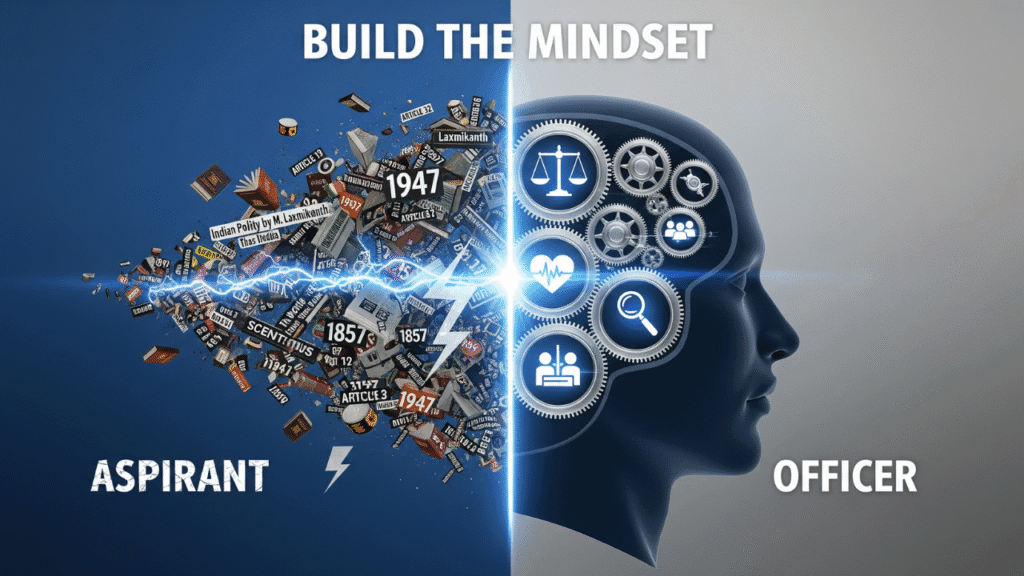
The interview doesn’t start in the Dholpur House; it starts today. Learn how to transform your daily study habits into a training ground for the administrative mind.
The Union Public Service Commission is not just looking for a human encyclopedia. They are searching for leaders, problem-solvers, and empathetic administrators who can handle the immense responsibility of public service. The Personality Test, often misunderstood as a mere Q&A session, is the final filter for this very purpose.
But the mindset of an officer isn’t a switch you can flip a week before the interview. It is a character you build, brick by brick, over the long and arduous journey of preparation. The secret of successful candidates is that they don’t just study for the exam; they use the exam to transform themselves. They start thinking like an officer long before they become one.
This is your guide to turning your preparation into a real-world training ground for developing those crucial Officer Like Qualities (OLQs).
1. Read the Newspaper Like a District Magistrate
Most aspirants read the newspaper to collect facts. You must learn to read it to diagnose problems. The next time you read about an issue—a flood, a local protest, a failing government scheme—don’t just memorize the what, where, and when.
Ask the questions a DM would ask:
- Immediate Priorities: What are the first three things I would do in the next six hours? (e.g., Rescue, Relief, Communication).
- Stakeholder Analysis: Who are all the parties involved? (Victims, local police, NGOs, political leaders, media). How do I manage their conflicting interests?
- Resource Mobilization: What resources do I have at my disposal? What more do I need, and how do I get it?
- Long-Term Solution: What is the root cause of this problem, and what policy-level changes can prevent it from happening again?
This simple shift turns passive reading into an active, daily simulation of an officer’s job. This is how to think like an IAS officer in real-time.
2. Study Schemes with the Heart of a Beneficiary
When you study a government scheme, it’s easy to get lost in the details—the launch date, the ministry in charge, the budget allocation. These are important, but they are lifeless without context.
To cultivate empathy, you must go one step further. For every scheme, ask:
- Who is the intended beneficiary? Picture that person. A farmer in a drought-prone area, a pregnant woman in a remote village, an unemployed youth.
- What is the single biggest obstacle they would face in accessing this scheme? (Lack of awareness, complex paperwork, corruption, last-mile delivery issues).
- If I had to explain this scheme to them in two simple sentences, what would I say?
This practice breathes life into dry policy documents. It builds the empathy that will shine through in your Mains answers and your interview, proving you are not just a scholar but a public servant in waiting.
3. Treat GS Paper 4 Case Studies as Your First Posting
The Ethics paper is the most direct training ground for an administrative mindset. Do not treat case studies as academic exercises to be solved for 10 or 15 marks. Treat each one as a file that has landed on your desk during your first posting.
- Don’t just list options; weigh them. Write down the real-world consequences of each choice. Who benefits? Who suffers? What are the political and administrative repercussions?
- Make a decision. Don’t hide behind theoretical jargon. State clearly: “In this situation, I would choose Option C.”
- Justify it with courage. Defend your decision not just on legal or ethical grounds, but with practical wisdom. “This decision is not perfect, but it is the most effective and compassionate choice given the limitations.”
This is how you develop administrative skills in decision-making and moral courage.
4. Shift from a Critic to a Solution Architect
It is easy to criticize government failures. It takes no effort. The mindset of an officer is not to complain about problems but to architect solutions.
The next time you identify a flaw in a policy or its implementation, challenge yourself with this question: “If I were the Joint Secretary in that ministry, what three specific, actionable, and budget-conscious recommendations would I propose to my minister?”
This forces you to move beyond simplistic criticism and engage in the complex, nuanced work of governance. It demonstrates a constructive and proactive mindset—the very essence of an effective officer.
The transformation into an officer does not happen at LBSNAA. It begins now, in your study room, with the way you choose to think. By cultivating these qualities daily, the interview will cease to be an intimidating interrogation. It will become a conversation between you and your future colleagues, who will recognize in you a mind that is already one of their own.








